- Home
- Ken Follett
Night Over Water Page 28
Night Over Water Read online
Page 28
Eddie’s attitude to Tom Luther had been forgotten, during the second dinner sitting, in the excitement of the near-fight between Mervyn Lovesey and Lord Oxenford. Eddie had not witnessed it—he had been in the forward compartment, worrying—but the stewards had told him all about it soon afterward. To Eddie, Oxenford seemed a brute who needed to be brought down a peg or two, and that was what Captain Baker had done. Eddie felt sorry for the boy, Percy, being raised by such a father.
The third sitting would be coming to an end in a few minutes, and then things would start to go quiet on the passenger deck. The older ones would go to bed. The majority would sit for a couple of hours, riding the bumps, too excited or nervous to feel sleepy; then, one by one, they would succumb to nature’s timetable and retire to bed. A few diehards would start a card game in the main lounge, and they would continue drinking, but it would be the quiet, steady kind of all-night drinking that rarely led to trouble.
Eddie anxiously plotted the plane’s fuel consumption on the chart they called “the Howgozit Curve.” The red line that showed actual consumption was consistently above the pencil line of his forecast. That was almost inevitable, since he had faked his forecast. But the difference was greater than he had expected, because of the weather.
, He got more worried as he worked out the plane’s effective range with the remaining fuel. When he made the calculations on the basis of three engines—which he was obliged to do by the safety rules—he found that there was not enough fuel to take them to Newfoundland.
He should have told the captain immediately, but he did not.
The shortfall was very small: with four engines there would be enough fuel. Furthermore, the situation might change in the next couple of hours. The wind might be lighter than forecast, so the plane would use less fuel than anticipated, and there would be more left for the rest of the journey. And finally, if worse came to worst, they could change their route and fly through the heart of the storm, thereby shortening the distance. The passenger would just have to suffer the bumps.
On his left the radio operator, Ben Thompson, was transcribing a Morse code message, his bald head bent over his console. Hoping it would be a forecast of better weather, Eddie stood behind him and read over his shoulder.
The message astonished and mystified him.
It was from the F.B.I., addressed to someone called Ollis Field. It read:THE BUREAU HAS RECEIVED INFORMATION THAT ASSOCIATES OF KNOWN CRIMINALS MAY BE ON YOUR FLIGHT. TAKE EXTRA PRECAUTIONS WITH THE PRISONER.
What did it mean? Did it have something to do with the kidnapping of Carol-Ann? For a moment Eddie’s head spun with the possibilities.
Ben tore the page off his pad and said: “Captain! You’d better take a look at this.”
Jack Ashford glanced up from his chart table, alerted by the urgent note in the radioman’s voice. Eddie took the message from Ben, showed it to Jack for a moment, then passed it to Captain Baker, who was eating steak and mashed potatoes from a tray at the conference table at the rear of the cabin.
The captain’s face darkened as he read. “I don’t like the look of this,” he said. “Ollis Field must be an F.B.I., agent.”
“Is he a passenger?” Eddie asked.
“Yes. I thought there was something strange about him. Drab character, not a typical Clipper passenger. He stayed on board during the stopover at Foynes.”
Eddie had not noticed him, but the navigator had. “I think I know who you mean,” said Jack, scratching his blue chin. “Bald guy. There’s a younger fellow with him, kind of flashily dressed. They seem like an odd couple.”
The captain said: “The kid must be the prisoner. I think his name is Frank Gordon.”
Eddie’s mind was working fast. “That’s why they stayed on board at Foynes: the F.B.I., man doesn’t want to give his prisoner a chance to escape.”
The captain nodded grimly. “Gordon must have been extradited from Britain—and you don’t get extradition orders for shoplifters. The guy must be a dangerous criminal. And they put him on my plane without telling me!”
Ben, the radio operator, said: “I wonder what he did.”
“Frank Gordon,” Jack mused. “It rings a bell. Wait a minute—I bet he’s Frankie Gordino!”
Eddie remembered reading about Gordino in the newspapers. He was an enforcer for a New England gang. The particular crime he was wanted for involved a Boston nightclub owner who refused to pay protection money. Gordino had burst into the club, shot the owner in the stomach, raped the man’s girlfriend, then torched the club. The guy died, but the girl escaped the fire and identified Gordino from pictures.
“We’ll soon find out if it’s him,” said Baker. “Eddie, do me a favor. Go and ask this Ollis Field to come up here.”
“Sure thing.” Eddie put on his cap and uniform jacket and went down the stairs, turning this new development over in his mind. He was sure there was some connection between Frankie Gordino and the people who had Carol-Ann, and he tried frantically to figure it out, without success.
He looked into the galley, where a steward was filling a coffee jug from the massive fifty-gallon urn. “Davy,” he said, “where’s Mr. Ollis Field?”
“Compartment number four, port side, facing the rear,” the steward said.
Eddie walked along the aisle, keeping his balance on the unsteady floor with a practiced gait. He noticed the Oxenford family, looking subdued in number 2 compartment. In the dining room the last sitting was just about finished, after-dinner coffee spilling into the saucers as the gathering storm buffeted the plane. He went through number 3, then up a step to number 4.
In the rear-facing seat on the port side was a bald man of about forty, looking sleepy, smoking a cigarette and staring through the window at the darkness outside. This was not Eddie’s picture of an F.B.I., agent: he could not see this man with a gun in his hand bursting into a room full of bootleggers.
Opposite Field was a younger man, much better dressed, with the build of a retired athlete putting on weight. That would have to be Gordino. He had the puffy, sulky face of a spoiled child. Would he shoot a man in the stomach? Eddie wondered. Yes, I think he would.
Eddie spoke to the older man. “Mr. Field?”
“Yes.”
“The captain would like a word, if you can spare him a moment.”
A slight frown crossed Field’s face, followed by a look of resignation. He had guessed that his secret was out, and he was irritated, but his look said in the long run it was all the same to him. “Of course,” he said. He crushed out his cigarette in the wall-mounted ashtray, unfastened his seat belt and stood up.
“Follow me, please,” Eddie said.
On the way back, passing through number 3 compartment, Eddie saw Tom Luther, and their eyes met. In that instant Eddie had a flash of inspiration.
Tom Luther’s mission was to rescue Frankie Gordino.
He was so struck by the explanation that he stopped, and Ollis Field bumped into his back.
Luther stared at him with a panicky look in his eyes, obviously afraid Eddie was going to do something that would give the game away.
“Pardon me,” Eddie said to Field, and he walked on.
Everything was becoming clear. Frankie Gordino had been forced to flee the States, but the F.B.I., had tracked him down in Britain and got him extradited. They had decided to fly him back, and somehow his partners in crime had found out about it. They were going to try to get Gordino off the plane before it reached the United States.
That was where Eddie came in. He would bring the Clipper down in the sea off the Maine coast. There would be a fast boat waiting. Gordino would be taken off the Clipper and would speed away in the boat. A few minutes later he would go ashore at some sheltered inlet, possibly on the Canadian side of the border. A car would be waiting to whisk him into hiding. He would have escaped justice—thanks to Eddie Deakin.
As he led Field up the spiral staircase to the flight deck, Eddie felt relieved that at last he understood
what was going on, and horrified that in order to save his wife he had to help a murderer go free.
“Captain, this is Mr. Field,” he said.
Captain Baker had put on his uniform jacket and was seated behind the conference table with the radio message in his hand. His dinner tray had been taken away. His cap covered his blond hair, and gave him an air of authority. He looked up at Field, but did not ask him to sit down. “I’ve received a message for you—from the F.B.I.,” he said.
Field held out his hand for the paper, but Baker did not give it to him.
“Are you an agent of the F.B.I.?” the captain asked.
“Yes.”
“And are you on Bureau business right now?”
“Yes, I am.”
“What is that business, Mr. Field?”
“I don’t think you need to know that, Captain. Please give me the message. You did say it was addressed to me, not to you.”
“I’m the captain of this vessel, and it’s my judgment that I do need to know what business you’re on. Don’t argue with me, Mr. Field. Just do as I say.”
Eddie studied Field. He was a pale, tired man with a bald head and watery blue eyes. He was tall, and had once been powerfully built, but now he was round-shouldered and slack-looking. Eddie judged him to be arrogant rather than brave, and this judgment was confirmed when Field immediately caved in under pressure from the captain.
“I’m escorting an extradited prisoner back to the United States for trial,” he said. “His name is Frank Gordon.”
“Also known as Frankie Gordino?”
“That’s right.”
“I want you to know, mister, that I object to your bringing a dangerous criminal on board my airplane without telling me.”
“If you know the man’s real name, you probably also know what he does for a living. He works for Raymond Patriarca, who is responsible for armed robberies, extortion, loan-sharking, illegal gambling and prostitution from Rhode Island to Maine. Ray Patriarca has been declared Public Enemy Number One by the Providence Board of Public Safety. Gordino is what we call an enforcer: he terrorizes, tortures and murders people on Patriarca’s orders. We couldn’t warn you about him, for security reasons.”
“Your security is shit, Field.” Baker was really angry: Eddie had never known him to swear at a passenger. “The Patriarca gang knows all about it.” He handed over the radio message.
Field read it and turned gray. “How the hell did they find out?” he muttered.
“I have to ask which passengers are the ‘associates of known criminals,’ ” said the captain. “Do you recognize anyone on board?”
“Of course not,” Field said irritably. “If I had, I would have alerted the Bureau already.”
“If we can identify the people I’ll put them off the plane at the next stop.”
Eddie thought: I know who they are—Tom Luther and me.
Field said: “Radio the Bureau with a complete list of passengers and crew. They’ll run a check on every name.”
A shiver of anxiety ran through Eddie. Was there any risk that Tom Luther would be exposed by this check? That could ruin everything. Was he a known criminal? Was Tom Luther his real name? If he was using a false name he needed a forged passport too—but that might not be a problem if he was in league with big-time racketeers. Surely he would have taken that precaution? Everything else he had done had been well organized.
Captain Baker bristled. “I don’t think we need to worry about the crew.”
Field shrugged. “Please yourself. The Bureau will get the names from Pan American in a minute.”
Field was a tactless man, Eddie reflected. Did F.B.I.., agents get advice on how to be unpleasant from J. Edgar Hoover?
The captain picked up the passenger manifest and crew list from his table and handed it to the radio operator. “Send that right away, Ben,” he said. He paused, then added: “Include the crew.”
Ben Thompson sat at his console and began to tap out the message in Morse.
“One more thing,” the captain said to Field. “I’ll have to relieve you of your weapon.”
That was smart, Eddie thought. It had not even occurred to him that Field might be armed—but he had to be, if he was escorting a dangerous criminal.
Field said: “I object—”
“Passengers are not allowed to carry firearms. There are no exceptions to this rule. Hand over your gun.”
“If I refuse?”
“Mr. Deakin and Mr. Ashford will take it from you, anyway.”
Eddie was surprised by this announcement, but he played the part and moved threateningly closer to Field. Jack did the same.
Baker continued. “And if you oblige me to use force, I will have you put off the plane at our next stop, and I will not permit you to reboard.”
Eddie was impressed at how the captain maintained his superiority despite the fact that his antagonist was armed. This was not how it happened in the movies, where the man with the gun was able to boss everyone else around.
What would Field do? The F.B.I., would not approve of his giving up his gun, but on the other hand it would surely be worse to get thrown off the plane.
Field said: “I’m escorting a dangerous prisoner—I need to be armed.”
Eddie saw something out of the corner of his eye. The door at the rear of the cabin, which led to the observation dome and the cargo holds, was ajar, and behind it something moved.
Captain Baker said: “Take his gun, Eddie.”
Eddie reached inside Field’s jacket. The man did not move. Eddie found the shoulder holster, unbuttoned the flap and withdrew the gun. Field looked ahead stonily.
Then Eddie stepped to the rear of the cabin and threw open the door.
Young Percy Oxenford stood there.
Eddie was relieved. He had half imagined that some of Gordino’s gang would be waiting there with machine guns.
Captain Baker stared at Percy and said: “Where did you come from?”
“There’s a ladder next to the ladies’ powder room,” Percy said. “It leads up into the tail of the plane.” That was where Eddie had inspected the rudder trim control cables. “You can crawl along from there. It comes out by the baggage holds.”
Eddie was still holding Ollis Field’s gun. He put it in the navigator’s chart drawer.
Captain Baker said to Percy: “Go back to your seat, please, young man, and don’t leave the passenger cabin at any time during the remainder of the flight.” Percy turned to go back the way he had come. “Not that way,” Baker snapped. “Down the stairs.”
Looking a little scared, Percy hurried through the cabin and scuttled off down the stairs.
“How long had he been there, Eddie?” asked the captain.
“I don’t know. I guess he probably heard the whole thing.”
“There goes our hope of keeping this from the passengers.” For a moment Baker looked weary, and Eddie had a flash of insight into the weight of responsibility the captain carried. Then Baker became brisk again. “You may return to your seat, Mr. Field. Thank you for your cooperation.” Ollis Field turned around and left without speaking. “Let’s get back to work, men,” the captain finished.
The crew returned to their stations. Eddie checked his dials automatically, although his mind was in turmoil. He observed that the fuel tanks in the wings, which fed the engines, were getting low, and he proceeded to transfer fuel from the main tanks, which were located in the hydrostabilizers, or sea-wings. But his thoughts were on Frankie Gordino. Gordino had shot a man and raped a woman and burned down a nightclub, but he had been caught, and would be punished for his horrible crimes—except that Eddie Deakin was going to save him. Thanks to Eddie, that girl would see her rapist get away scot-free.
Worse still, Gordino would almost certainly kill again. He was probably no good for anything else. So a day would come when Eddie would read in the papers of some ghastly crime—it might be a revenge murder, the victim tortured and mutilated before being
finished off, or perhaps a building torched with women and children burned to death inside, or a girl held down and raped by three different men—and the police would link it with Ray Patriarca’s gang, and Eddie would think: Was that Gordino? Am I responsible for that? Did those people suffer and die because I helped Gordino escape?
How many murders would he have on his conscience if he went ahead with this?
But he had no choice. Carol-Ann was in the hands of Ray Patriarca. Every time he thought of it he felt cold sweat dampen his temples. He had to protect her, and the only way he could do that was to cooperate with Tom Luther.
He looked at his watch: it was midnight.
Jack Ashford gave him the plane’s current position, as best he could estimate it: he had not yet been able to shoot a star. Ben Thompson produced the latest weather forecasts: the storm was a bad one. Eddie read off a new set of figures from the fuel tanks and began to update his calculations. Perhaps this would resolve his dilemma: if they did not have enough fuel to reach Newfoundland, they would have to turn back, and that would be the end of it. But the thought was no consolation to him. He was no fatalist: he had to do something.
Captain Baker sang out: “How goes it, Eddie?”
“Not quite done,” he replied.
“Look sharp—we must be close to the point of no return.”
Eddie felt a bead of sweat drip down his cheek. He wiped it away with a quick, surreptitious movement.
He finished the arithmetic.
The remaining fuel was not enough.
For a moment he said nothing.
He bent over his scratch pad and his tables, pretending he had not yet finished. The situation was worse than it had been at the start of his shift. Now there was not enough fuel to finish the journey, on the route the captain had chosen, even on four engines: the safety margin had disappeared. The only way they could make it was to shorten the journey by flying through the storm instead of skirting it; and even then, if they should lose an engine, they would be finished.
All these passengers would die, and he would too; and then what would happen to Carol-Ann?

 The Pillars of the Earth
The Pillars of the Earth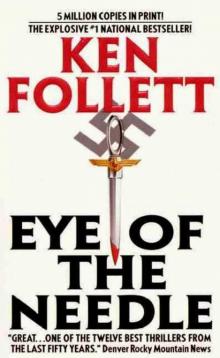 Eye Of The Needle
Eye Of The Needle Lie Down With Lions
Lie Down With Lions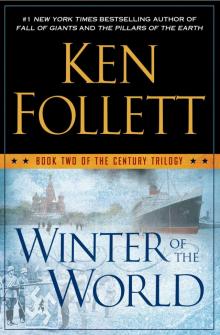 Winter of the World
Winter of the World Triple
Triple World Without End
World Without End Fall of Giants
Fall of Giants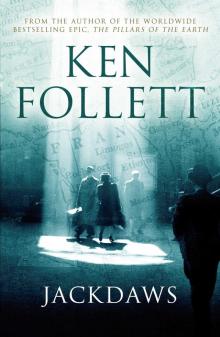 Jackdaws
Jackdaws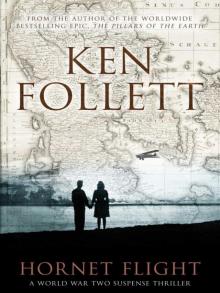 Hornet Flight
Hornet Flight Whiteout
Whiteout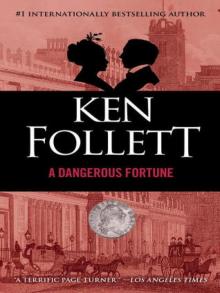 A Dangerous Fortune
A Dangerous Fortune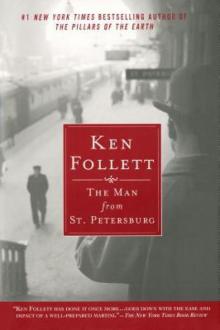 The Man From St. Petersburg
The Man From St. Petersburg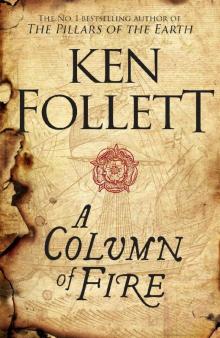 A Column of Fire
A Column of Fire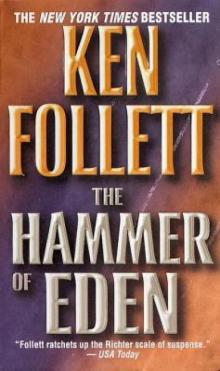 The Hammer of Eden
The Hammer of Eden On Wings of Eagles
On Wings of Eagles The Evening and the Morning
The Evening and the Morning The Key to Rebecca
The Key to Rebecca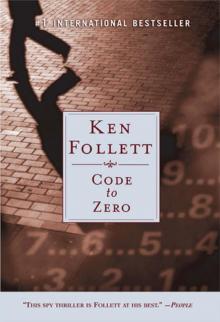 Code to Zero
Code to Zero Paper Money
Paper Money A Place Called Freedom
A Place Called Freedom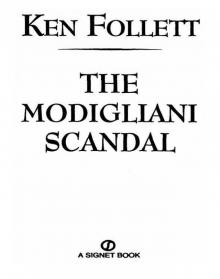 The Modigliani Scandal
The Modigliani Scandal Triple (1991)
Triple (1991) A Dangerous Fortune (1994)
A Dangerous Fortune (1994)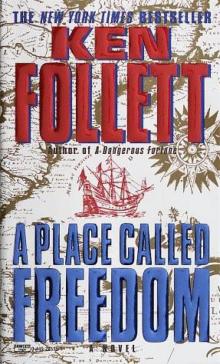 A Place Called Freedom (1995)
A Place Called Freedom (1995) Winter of the World (Century Trilogy 2)
Winter of the World (Century Trilogy 2) Code to Zero (2000)
Code to Zero (2000)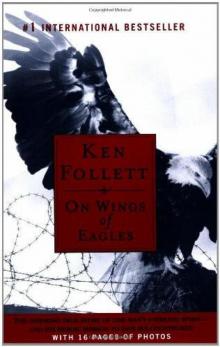 On Wings Of Eagles (1990)
On Wings Of Eagles (1990) Storm Island
Storm Island Fall of Giants (The Century Trilogy)
Fall of Giants (The Century Trilogy)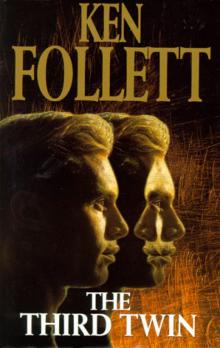 the Third Twin (1996)
the Third Twin (1996)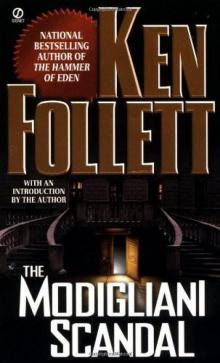 The Modigliani Scandal (1976)
The Modigliani Scandal (1976)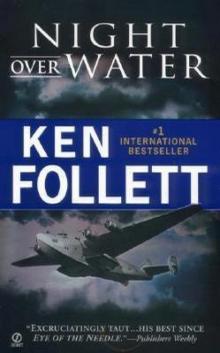 Night Over Water
Night Over Water